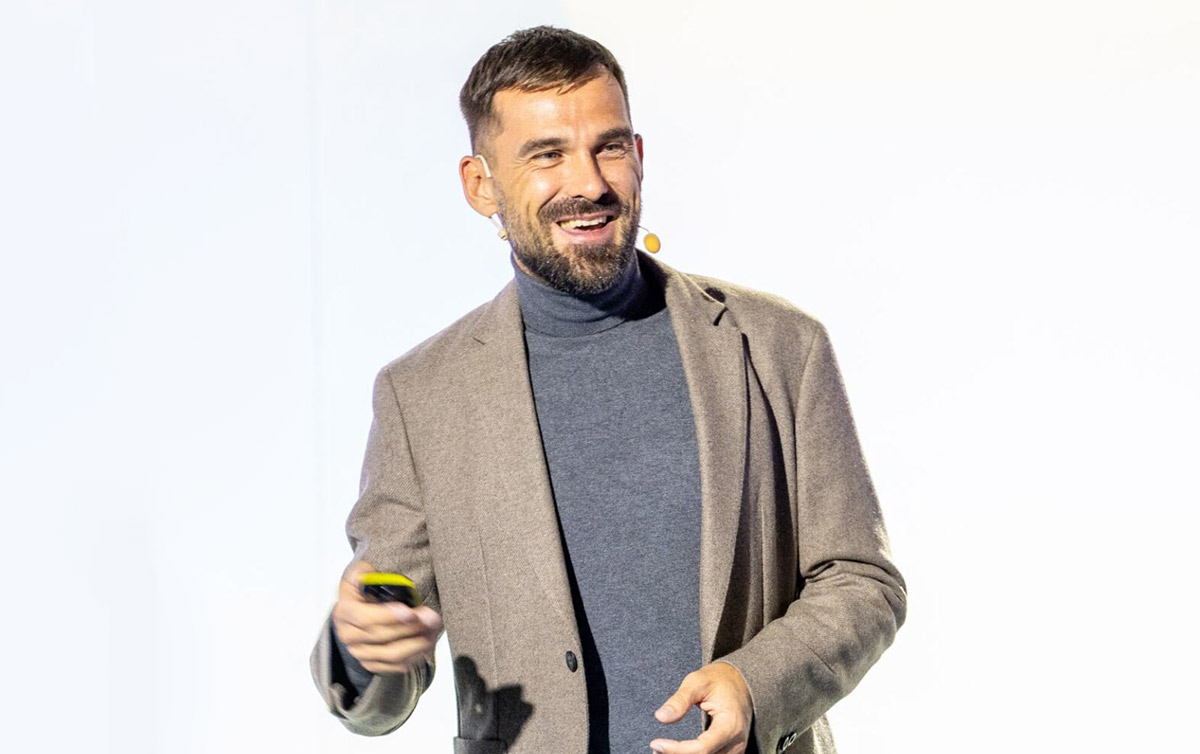What are the key areas in business where sports psychology can be successfully applied?
Paweł Habrat: Every year there are more and more cases of leveraging sports psychology in business. Nowadays, sports psychology is understood much more broadly than just caring for a player’s development and well-being. Some of this knowledge is used to work with sports teams, so it can also be used to manage teams in companies. The key issue is a cooperative mindset. This allows individuals to increase their effectiveness in team activities as well as enables self-fulfilment.
In the case of a coach-manager, sports psychology provides effective methods to manage people, that is, leadership tools. On the other hand, working in such a position involves tremendous overload, so sports psychology also provides the coach-manager with ways to manage themselves, pressure and stress. It’s about skills to help reduce the number of negative factors that come in the way of achieving a goal.
How can sports psychology help build a company that rocks?
There is no one-size-fits-all recipe that automatically guarantees that a company will achieve all its goals. However, there are three key elements that need to be ensured in order to make achieving goals viable. The first one is an effective leader who has a clear vision for the company’s growth and who keeps an eye on the implementation of a strategy that defines specific business goals.
The second one, without which it is difficult to imagine the functioning of the company in the long term, is the right work atmosphere. Only through it is it possible to meet project objectives and at the same time implement activities for the development of employees, who can then achieve their individual goals.
Furthermore, it is important to remember that sports and business involve competition. Managers must therefore ensure that they use it to improve the skills of individual employees. And this is where the third element comes into play, namely efficient communication. It must be ongoing in nature in order to integrate the team and lead it to achieve the set goal.
So what is the correlation between a leader in sports and a leader in business?
The concept of a leader has changed a lot over the years. Previously, we had a stereotype of a man with charisma, representing the type of tough leader. Nowadays, however, a leader is a person equipped with a range of soft skills, having highly developed emotional intelligence and empathy. So this is a leader who not only delegates tasks, but also provides support that brings the team closer to achieving goals.
I am very fond of a saying that is often used in the world of sports: “A leader is not a special person, but a person with whom others feel special”. And this means that a leader must first and foremost provide their employees with opportunities for long-term development. A true leader is a person who efficiently leads a team, but at the same time the team feels their authentic support all the time.
How should a leader in sports/business build their authority within the team?
I think this question should be reversed. This is because it is much more important to uphold authority, as both the coach and manager already have their authority “by default”. Such authority is strictly connected with their roles. Unfortunately, we very often forget about it and try to build it only when we start to lose it.
There are certain aspects associated with the position of a leader, such as observing the rules, credibility, and being yourself both at work and outside of it. It is very important for a leader to have insight into themselves and understand their emotions while being aware that their attitude has a huge impact on how not only the whole team will function, but also the individuals that make up the team.
Can experience from team games be used to divide the team into specific roles? Is it possible to have a division that reflects the company’s structure, in which the roles of director, manager and employees are clearly defined?
Yes, it is useful to leverage the experience from team games, because every team in the company, just like every sports team, has a certain internal balance. For example, in a sports team, there are some players who are simply good performers, but there are also those who are “artists” and can perform tasks that are more complicated or unusual.
At the same time, let’s remember that the issue of teamwork on the pitch is also a matter of the coaching staff’s work. So we are talking about two teams, where one coordinates the activities of the other. Every player or employee must know their role in a sports or company team. On the one hand, it must be defined in a formal way, and on the other – in a less formal way, resulting from changing circumstances.
Action is shaped in a process consisting of joint meetings, conversations and analysing what happens on a weekly or daily basis. At the same time, this means that everyone must follow the roles within the process. And while not all processes can be planned, all of them can be discussed and modified.
How to make a company team close-knit and successful?
Two types of activities are necessary. The first is strictly team-building, i.e. activities designed to integrate a sports team before the season or a company team before launching a project. The second one is practical, which involves strengthening team members’ competencies and communication skills.
Keep in mind that not only successes, but also failures play a positive, creative role. The latter are usually a sensitive moment, regardless of whether it’s a situation on the pitch or in the office. And that is why it’s so important to focus on communication and analyse the reasons for failure in order to properly plan the message to the team before the next game or stage of the project.
Difficult situations cannot be left without reaction. However, one must bear in mind that working with people is a complex challenge. While the emotions that arise at the moment of failure are temporary, in some employees/players, they can persist for a long time. Therefore, it is necessary to pay attention not only to the group, but also to apply an individual approach to certain people.
Every team is made up of individuals. So, for achieving team success in a company, is it crucial to have a goal-oriented mindset around which the team integrates and all players-employees “play” for a common result?
Absolutely, because both in sports and in a company, all activities must be subordinated to the overarching goal to be achieved by the entire team. In the case of sports, not only the players, but also the coaching staff are held accountable for the result. The axis of competence of a coach or manager must therefore be the ability to break down the desired goal into task-based objectives, so that each team member not only knows their role, but is able to carry out the tasks assigned.
To achieve goals in team sports, such as football, it’s not about a single match, but the whole season. Consistent performance and monitoring of targets are therefore crucial. In the case of task-based goals, it is essential that we can modify them and have a great deal of influence on them directly.
How should a coach-manager work with people to bring out their full potential and increase their motivation?
The assumption that motivation changes is wrong – because it is our attitude that can be changed. And these are two completely different things. A player’s or employee’s commitment depends on their attitude, and this can change under the influence of the moment, such as due to fatigue.
While we can change attitudes momentarily, motivation is a much broader concept. It is something that forms the basis of our actions, even if there are times when we don’t always perform certain tasks with a smile on our face. It is the attitude that is the key to success, and it is the job of the coach-manager to build a positive attitude among team members.
Coach-managers and teams are regularly held accountable for their work, and the “pressure to deliver” often leads to stress. What can be done to reduce its severity in the workplace?
First of all, it must be assumed that stress – both in sports and business – will always occur. Stress agents are common and we just have to learn to live with them. However, we need to be aware that stress reactions are often informative – they occur during difficult moments when we face a specific challenge.
In such situations, we must take care to understand why the stress reaction has occurred and what information and clues it provided us with. Support groups then come to the rescue, which can be formed not only at work, but also outside of it. The very fact that we will be able to talk about problems means that we are taking a big step forward.
Another thing is to carefully analyse the situation and identify the elements over which we have real influence. It also involves the requirements placed on us and our ability to meet them. Let’s also remember that the stress reaction – as part of the experience – makes us adapt to difficult situations, which can help us cope with it in such cases in the future.
Under certain conditions, stress can also mobilise us to act – but of course, only to a certain extent. Thus, it is crucial to strike a balance in order to understand stress and then react and reduce its intensity so that you can take care of your well-being in the right way.
What are the most important actions to successfully ensure team well-being in the company?
The key steps in ensuring well-being are clear communication and a process-oriented mindset. It is important to remember that a sports team will not achieve its goal at the end of the season with just one game won. Meanwhile, a process-oriented mindset allows us to analyse the situation on an ongoing basis and stick to certain assumptions we made at the beginning. This gives us an overview of the entire process, allowing us to modify it according to our needs and stage of implementation.
What role does physical activity play in building corporate well-being? How does it help regenerate the body and mind?
For years, doctors and psychologists have been promoting a lifestyle a regular part of which are various sports activities. They play an immense role not only because of the need to take care of the body, but also of the mind. This is important, among other things, because work overload often translates into a change in the way of thinking and various emotional states.
Fortunately, we can regulate such overload precisely through physical activity. So it is worth finding an element of balance in the form of the “I” area, that is, introduce a habit related to sports activities that will be healthy, but will also be a pleasure, giving us a break from what is going on in both our professional and personal lives.





















